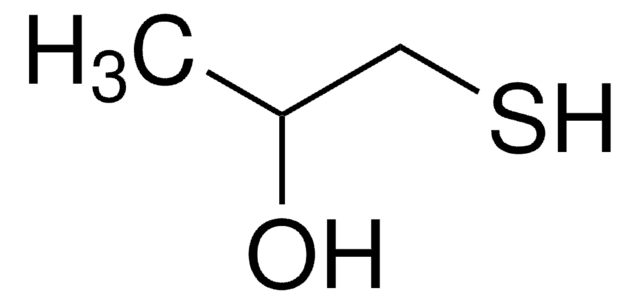725382
1,6-Hexanedithiol
99.5%
Synonym(s):
1,6-Dimercaptohexane, DMH, Hexamethylene dimercaptan
About This Item
Recommended Products
vapor pressure
~1 mmHg ( 20 °C)
Assay
99.5%
form
liquid
refractive index
n20/D 1.511 (lit.)
bp
118-119 °C/15 mmHg (lit.)
mp
−21 °C (lit.)
density
0.983 g/mL at 25 °C (lit.)
SMILES string
SCCCCCCS
InChI
1S/C6H14S2/c7-5-3-1-2-4-6-8/h7-8H,1-6H2
InChI key
SRZXCOWFGPICGA-UHFFFAOYSA-N
Looking for similar products? Visit Product Comparison Guide
General description
Application
Storage Class Code
10 - Combustible liquids
WGK
WGK 3
Flash Point(F)
195.8 °F - closed cup
Flash Point(C)
91 °C - closed cup
Choose from one of the most recent versions:
Certificates of Analysis (COA)
Don't see the Right Version?
If you require a particular version, you can look up a specific certificate by the Lot or Batch number.
Already Own This Product?
Find documentation for the products that you have recently purchased in the Document Library.
Customers Also Viewed
Articles
Recent research highlights tunable properties of inorganic nanoparticles, driving interest in optoelectronics.
Our team of scientists has experience in all areas of research including Life Science, Material Science, Chemical Synthesis, Chromatography, Analytical and many others.
Contact Technical Service











